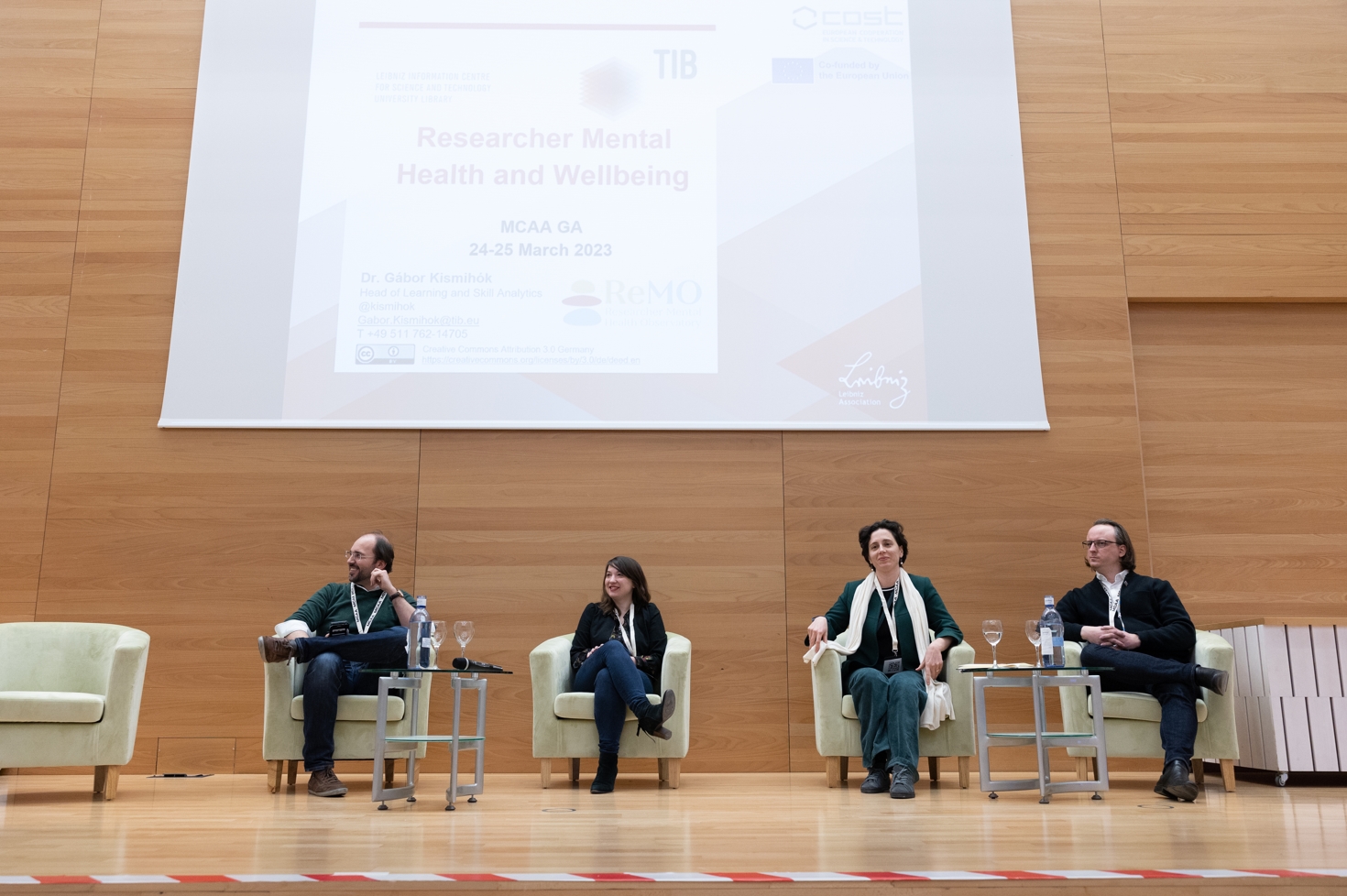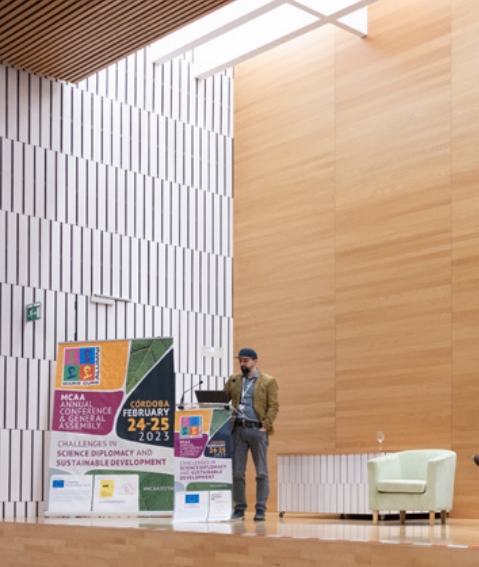MCAA Annual Conference 2023 - Researchers' Mental Health and wellbeing: the dialogue has started, but a long way ahead!
Newsletter
In the academic research environment, we often hear many anecdotal experiences that it is not all well. We often notice that people come to work with suboptimal moods, underperform, or do not cheer up. Does it need to be like this? Can we do something to change the status quo?
A session was organized at the MCAA’s annual conference to discuss how researchers and research communities can contribute to local research environments to improve wellbeing. Gabor Kismihok moderated the session with panelists Mathias Schroijen, Stéphanie Gauttier, Stefan Mol, Mayya Sundukova, and Christian Weber. The panelists shared insights and activities from Researcher Mental Health Observatory (ReMO) COST Action and related European projects: Online, open learning recommendations and mentoring towards Sustainable research CAReers (OSCAR-AI) and Advancing sustainable research careers for graduate students through training in mental wellbeing, open science, and communication skills (OEduverse).
The problem is systemic, and we can do better
Research shows that around 32-42% of people working in academic environments are at risk of having or developing a common psychiatric disorder (Levecque et al., 2017). Some of the common factors linked include the work-family interface, job demands and job control, the supervisor’s leadership style, team decision-making culture, and the perception of a career outside academia. Gabor Kismihok, ReMO Chair, presented quotes from a recent survey among Hungarian PhD students, more or less revealing the kind of research environment we are in; the students think: “I feel guilty and anxious all the time because I feel like I’m not doing my work well enough,” “I feel that after the PhD I will have almost no knowledge of anything that is useful in the job market,” “Even my extended family or close circle of friends fail to recognize the value of research work,” “My working hours are not flexible. In the evening I put my children to bed, then I have time for my “intellectual” tasks, but either I fall asleep or I can manage them, but then after 2-3 hours of sleep the clock is already ringing, because at 8am I have to be ready in my work uniform at the Institute. It’s very soul-crushing”, and “There is no differentiation on the basis of results/performance, which is not a motivating environment” (Kismihók, 2021). These observations point toward the systemic nature of the problem. We need to act now to change this status quo.
Career development could be a positive direction/solution
When we think about mental health and wellbeing, training is one of the essential components to focus on. Training should be personalized and also focus on mental health and career development. How can we provide accessible training opportunities to all researchers? OSCAR-AI’s eDoer platform, an Erasmus plus project, provides courses and mentoring with three main pillars: personalized AI-based recommendations platform to aid researchers in career development skills, facilitate reflection sharing on the career development, and provide psychological support to mitigate the stressful aspects of the academic environment. The free access eDoer platform is available as a web-based and mobile application for users to train on stress management, personal goal setting, work-life balance, and career planning. OEduverse (http://oeduverse.eu) is another ErasmusPlus project that provides training material to take control of one’s mental health situation and have agency over the suboptimal environment.

Voice out your opinion
One of the essential steps to solving a problem is to understand it. Are mental health problems brought about primarily by systemic, cultural, or individual factors? Can we indeed attribute most of the causes of burnout to the organization, as some claimed? To answer these questions, among others, ReMO Survey SIG (Special Interest Group) will collect data and evidence as to what are the working conditions within institutions across Europe; they set themselves the goal of launching the largest-ever benchmark on mental health in European academia (and beyond) through ReMO’s COST action network spanning 40 countries. This survey aims to explore the state of mental health across institutions and countries, the steps taken to nourish, protect, and sustain the mental health of researchers, and what policy-level support is in place. Similarly, ReMO’s WG1 tries to address the systemic level of the mental health problem. For example, they aim to create a comprehensive overview of each country’s mental health and related factors based on the collaborative process of managing our national policy briefs and capacity building by bringing different stakeholders together at local and international levels. We all need to voice our opinion through surveys and participate in the outcome of this mission. If you are interested in helping with the dissemination effort of Surveys, please contact Stefan (surveys@mariecuriealumni.eu). If you are interested in contributing to the ReMO policy briefs, please write to brian.cahill@tib.eu.

Be the change you want to see
We often see fellow researchers end up in research labs with suboptimal conditions. We want to help them and change the status quo but are unsure where to start and how to address the situation. To address the situation, you need not travel this path to change alone and end up burned out. You can find like-minded people in your surroundings and work towards a common goal. The ReMO ambassador program aims to train people who envision themselves as wellbeing ambassadors to advocate and make some change with the required support. It also trains communities for more mental health awareness. The program is open to early career researchers and senior researchers, research managers, administration people, and university personnel involved in mental health and psychological therapy because they are all stakeholders at different levels and can do something about the situation. The program includes understanding mental health at general and individual levels and how we can address it at doctoral school, university, and policy-making levels.
Researchers’ mental health and wellbeingare the most undermined issues that needattention and a remedy framework. Thereare multiple stakeholders involved and alsomultiple possible ways available to reach thegoal, but we need to ACT NOW!
Pradeep Eranti
MCAA Newsletter, Editorial Board
Twitter: @pradeeperanti
References
Levecque, K., Anseel, F., De Beuckelaer, A., Van der Heyden, J., & Gisle, L. (2017). Work organization and mental health problems in PhD students. Research Policy, 46(4), 868–879. https://doi.org/10.1016/j.respol.2017.02.008
Gábor Kismihók. (2021). Mentális egészséghez köthető problémák a magyar kutatásban - ReMO workshop [Data set]. Zenodo. https://doi.org/10.5281/zenodo.5554726